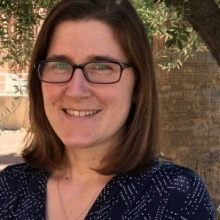Laura Condon: HydroGEN and pushing the boundaries of hydrologic modeling
This is what happens when you’ve always been interested in water. You ultimately run a National Science Foundation (NSF) funded convergence accelerator project. Well, that’s what Dr. Laura Condon is doing as an Associate Professor in the department of Hydrology and Atmospheric Sciences at the University of Arizona (UArizona). Condon's curiosity about water resources began as a young child working on her parents' pumpkin farm asking plenty of questions about water.

Answers to her questions came from many sources including an environmental engineering degree from Columbia University and an MS and PhD in Hydrologic Science and Engineering from the Colorado School of Mines. She also worked with an environmental consulting firm in Boulder, CO where she conducted modeling studies to address water availability and related issues. At graduate school, Condon learned about physically based modeling and contributed to water availability studies while working for the U.S. Bureau of Reclamation.
She decided to stay in research, because she really liked the work that she was doing on physically based modeling and wanted to improve tools so that they could be useful to decision makers. “I think that's always been my motivation as a scientist is really to solve real world problems,” says Condon. Her passion for solving real-world problems and her expertise in physically based modeling led her to academic positions, including Condon’s first professorship at Syracuse University.
At UArizona, Condon has a lot of different research projects. But one of the biggest that she leads is the NSF funded convergence accelerator project, HydroGEN. HydroGEN is a national platform for hydrologic modeling. It’s based on an integrated hydrologic model that simulates all of the groundwater and surface water in the contiguous U.S. at 1km resolution that Condon and her team helped develop. This is the only model of its kind for the country. However, the model is a research tool that requires hundreds of thousands of core hours on super computers to run and generates hundreds of terabytes of output. It is not built for general water managers to use. They need models that run quickly, as they routinely conduct scenarios that run out a hundred years and need to do many model runs.
To address this gap, the HydroGEN project has built a system of machine learning emulators and seamless modeling workflows that allow users to run watershed simulations a thousand times faster than the original hydrologic model without requiring any modeling expertise. Condon pushes the boundaries of hydrologic modeling, using machine learning model emulators to enhance the understanding and management of water resources.
All of this was made possible with the help of a funded software team and a big science team on the convergence accelerator. Nirav Merchant and his Data Science Institute team have been a huge help to Condon. Collaborating closely with CyVerse, the team has developed portable workflows that make it easier to visualize and analyze critical information.
Condon's work on HydroGEN highlights the importance of bridging the gap between scientific research and practical implementation, and how important it is to invest in software development and sustainable software platforms for that to happen. She appreciates that it is not enough just to have done the science to figure out how to build a machine learning emulator. To make it useful, one also needs to build the whole platform to make it accessible and easy to use. The HydroGEN team has worked with user experience specialists who helped make an application that is more intuitive and useful. According to Condon, “I'm working to move the science forward hand-in-hand with this platform development so that we can continue to make things accessible and useful outside of the science community.”
With her research, Condon intends to create a positive impact on the sustainability and resilience of water systems in the face of changing climates. Her dedication to making water data accessible and her commitment to bridging the gap between physical science and machine learning helps in her role as co-chair of the Presidential Advisory Commission on the Future of Agriculture and Food Production in a Drying Climate at UArizona.
Now, when not answering questions about water, Laura enjoys spending time outdoors with her family engaging in activities like hiking, biking, and running. For more information about the HydroGEN project or to connect with Laura Condon, email lecondon@arizona.edu.
